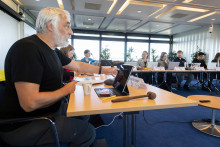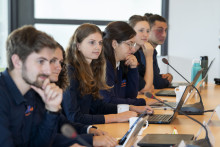What? I didn’t know we have an election week…
That’s possible, as we didn't have this before. This year is a first in that sense, a celebration of Drienerlo democracy if you will. Indeed, last year it was decided to amend the electoral regulations. Apart from the small print: the UT now has one central election week in which all possible forms of participation on campus can be voted on.
Why was this necessary?
On the one hand, to make it more manageable from a logistical perspective. Each participation body had its own election committee and electoral rules. So now there is one central regulation, one central election committee and one central election week. The main reason for such an election week is therefore to both increase the visibility and strengthen the participation bodies.
And there is a dire need for that, if you observe some trends of recent years. The enthusiasm seems to be waning somewhat, both among potential candidates and the electorate. Take the University Council alone. Three years ago, staff elections could not take place because there were too few candidates. For the student seats, surprisingly, four parties were suddenly in the race. Last year, however, there was little to choose from.
Moreover, the turnout of last year was disappointing, especially among students. 21.77 percent had cast their vote, which is remarkably low by UT standards. Moreover, national organisations like the Inspectorate of Education and LOVUM, the association of university councils, are worried about the state of the participation bodies. The same goes for Minister Dijkgraaf.
What is even meant by ‘participation’?
With a touch of imagination, the parallel with the House of Representatives or a municipal council is easily drawn. Just as a minister or councillor is responsible for making policy, there is the House of Representatives or a municipal council to think something of that policy. In the same way, you can see members of a UT participation body as a kind of representatives of the people. They have a say in the policies made by a faculty board, service department directors or the Executive Board. In the most serious case, policies may only be implemented if they have been approved by the participation body (right of consent). In addition, the participation body has advisory rights – the name says it all – and the right of initiative: they may also come up with their own proposals.
How does participation take shape at the UT?
It can be divided into two categories: the central participation body and the decentralised participation body. Central is the University Council, a representation of nine employees and nine students. They have a say in the policies of the Executive Board and all the regulations, budgets and reports involved.
The faculties and departments have their own councils, which are similar to the University Council. Faculty councils are also made up of students and employees. Service councils consist of employees working in the service department, with at least three and a maximum of seven members.
Who can I vote for during the election week?
That’s highly dependent on what you are part of at UT. All students can vote for the University Council. In fact, student elections take place every year, whereas for employees it is once every two years. Since employees were also able to vote in 2022, they will skip this year. Once again, there are two student parties on the electoral list, with 15 candidates each: UReka, active since 2001. And DAS – The Ambitious Student – which was founded in 2015.
Staff and students can also vote for people within their faculty or service. But whether there is really anything to vote on depends on the set-up and the number of candidates. The Centre for Educational Support (CES), for instance, is - as far as is (made) known - the only service that has a service council election on its agenda.
There are large variations between faculties. Whereas some faculties only hold student-based elections - with within BMS and EEMCS only candidates from UReka on the list, the S&T faculty contrasts this image: there were seven students on the candidate list for seven seats. Phrased differently, everyone on the list gets a seat and elections are unnecessary. S&T employees, on the other hand, have ample choice.
How can I vote?
We needn’t go to the voting booth en masse, armed with a red pencil. Voting can simply be done digitally, as you would expect from a technical university. You can cast your digital vote through this link, from 9 a.m. on Monday, the 12th of June. The election results will be announced on Friday, the 16th June and will immediately be made public by U-Today, of course!







